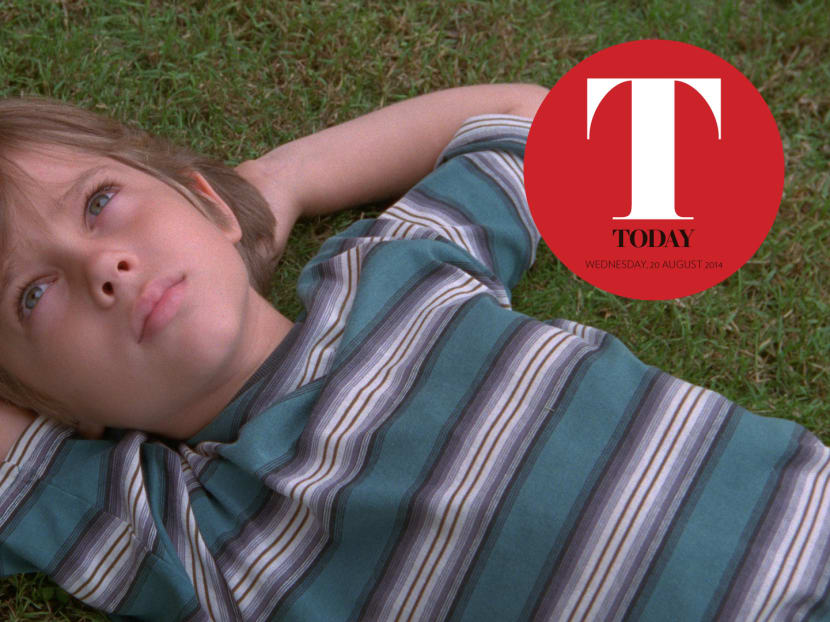Why everyone should go watch Richard Linklater’s Boyhood
It’s no secret that this writer worships at the altar of director Richard Linklater.

Richard Linklater's latest movie, Boyhood, tells the coming-of-age story of Mason, played by Ellar Coltrane.
It’s no secret that this writer worships at the altar of director Richard Linklater.
After all, Before Sunrise changed the way I looked at the rest of my life, Before Sunset augmented it and Before Midnight reaffirmed it. And let’s not even start on how much Slacker, Dazed And Confused, Waking Life and A Scanner Darkly factored into my movie viewing partialities.
And now there’s Boyhood, which is truly the tour de force critics are saying it is. The feature film was shot over the course of 12 years and it’s the coming-of-age story told through the eyes of a young man as he grew up. On the surface, it may seem a little gimmicky and indulgent: Assemble Ethan Hawke, Patricia Arquette and unknown eight-year-old Ellar Coltrane in 2002 for a unique experiment and meet every two years to shoot the ups and downs of a broken family over a decade.
There are no explosions, no high-speed chases, no supernatural shenanigans, no aliens, no melodrama. Just life as it unfolds — authentically ordinary, awkward, scrupulously observed life. But that is the film’s greatest strength. In Linklater’s deft hands, growing up with heartbreak, puberty, dysfunction, political changes and pop culture is made all the more astonishing, intriguing and resolutely real.
Boyhood is a powerful reminder of time, a philosophical treatise that not only comforts and disquiets, but also forces the audience to examine their own lives.
Q: Why are you so attracted to following characters through time?
A: I don’t know ... every movie could be made a sequel. It’s kind of like that with characters too. Every movie I’ve made ... what are (the characters) doing now? You feel like they’re living in a parallel world, but it’s fun to revisit them. But in this, the flip side of that, do the incremental build through their lives. That was a different journey all together.
Q: How logistically difficult was it to set this up?
A: Everything about it was technically impossible or really impractical at best. So that was a huge challenge. Starting with the funding. I met a few producers I knew who had some money, but they were like, ‘Great idea, but we don’t get that back for 12 years? Can we show a little bit of it on TV every three years?’ I’m like ‘No, it’s a movie!’ They just couldn’t wrap their head around it. They said, ‘We’re not a bank. We can’t just give money out.’ I said, ‘Well, maybe you should be a banker. If you’re a storyteller, then come on board!’
Q: When did you ask Patricia Arquette and Ethan Hawke to come on board?
A: I asked Ethan first because I’d worked with him a couple of times at that point. As a friend and collaborator, I just floated this idea by him. I was thinking he could play the dad. He was right at that age. He was like ‘Yeah, what a weird idea!’ Then I started thinking about who could be the mum. I had met Patricia once, but I just called her up and we talked for a long time. She had been a mum when she was pretty young — like 20 or something. So that was a big element. But I always liked her. I just liked her acting. She had this gusto to what she did, and she’s very sensitive and yet really strong and passionate. I just felt ... I could see her and Ethan as a volatile couple from the past maybe. In that two-hour conversation, we talked a lot about our own mums, ourselves as parents, ourselves as kids. I knew then this was someone I could collaborate with for 12 years. It’s really a mother-son story. I always felt the mum would be the through-line for sure, with the Dad circling around.
Q: Is it amazing to watch the physical ageing process of all these actors?
A: Well, I did it so gradually, because I was editing the whole way. I guess after eight years or so, I hadn’t seen the whole thing lately, and I would be editing year eight, and then just jump back to the first shot of the movie, and my editor and I would burst out laughing! So I knew it was working. It was working the way I wanted it to work, but it was good to get that emotional hit every now and then to reinforce what this was about.
Q: And did you have Plan B — in case one of the actors stopped acting?
A: No, there was no escape plan! Those thoughts vaguely cross your mind, but you don’t really go there. We had great faith in the process. I don’t know why. I think everyone believed in the core mission of the film.
Q: Did you have to do a lot of takes?
A: Yeah, we did a lot of takes on the day, but we don’t re-shoot. I never go ‘Oh, I have an idea, let’s go back.’ We never re-shot a scene. But the key is to make it work that day, to work really hard in the days leading up to that. Some scenes were more difficult than others.
Q: What props did you choose to make us think of the eras? Did you shoot six months later to latch on to what was popular?
A: No, we were pretty much in the moment. I just knew when I’m looking at an iMac — ‘This is going to change.’ Certain technological things. But I’m really amazed, looking back, at how little things changed in the physical world. That’s more interesting to me than most of the changes that are technological.
Q: There are a lot of Apple products in the film ...
A: And they give you nothing! Apple gives you nothing for a film! They’ll let you use it, that’s it. It’s almost like Apple are the cars from before – like ‘Oh, that’s a ’64 Mustang’ or that’s a ’67 Mustang’. I grew up, able to name the year of a car. Now you can name the year of a computer, sadly. That’s the world we’re living in — at least where I live.
Q: How did you licence the music?
A: It was a big challenge. It was a year-by-year chronology, but also trying to get the point-of-view of the character — like, ‘Who is listening? Is this on the radio? Is this what Patricia is listening to? Is this is what Ethan is listening to?’ It’s trying to get a point-of-view into the music. So, yeah, it was fun. It was a challenge for me. I started thinking about this when I was 40. I can’t tell you what an 8 year-old is necessarily listening to, but I had some consultants. Ellar was not that much help either! His taste was like Pink Floyd, Radiohead ... his taste was so advanced for his age!
Q: At what stage did you think about putting your daughter in?
A: It was around the time I was casting Ellar. She was this very exuberant, singing-dancing girl. She had been in my film Waking Life, briefly, at the very beginning, and she had been trying to get in every film. She grew up on movie sets, so it was not a big deal for her to be in a movie. It would’ve felt unnatural for her not to be. She would’ve been very angry at me if I had cast a girl anywhere near her age. I would probably have never heard the end of it. But that was the first few years of the shoot. Then I think she realised that wasn’t her passion – acting.
Q: Was it hard to keep a visual consistency over time?
A: No, no. That was the plan. Like I was saying, the culture helped us to stay the same, to a large degree. That was just the plan – shoot on film. I had a visual plan for the movie. I didn’t want the styles to change.
Q: What is the love story between you and Ethan Hawke?
A: I think its comrades, like blood brothers. It just evolved. It was twenty years ago now when we were probably gearing up to go shoot in Vienna, Summer of ’94. We were talking about it. I don’t think we would’ve predicted that we would work together seven times or whatever. But it just worked out that way. I’ve worked with a number of actors over the years.
Q: How close was Ellar’s personality to that of his character, Mason?
A: We knew that it would meld together at some point. Ellar was a little advanced for his age, but at some point, this film would catch up with Ellar’s essence a little more, who he really was.
Q: How much of your personality is in your movies?
A: I consider them very personal so I guess my personality is in there. I always said this was a collaboration between my childhood memories, Ellar’s childhood, Ethan’s childhood, Patricia’s…but it’s hard to say, hard to give a percentage.
Q: A lot of your movies deal with time. Is it an obsession?
A: I don’t think it’s an obsession. It’s just an approach. It’s just a way I think story-telling wise. Time is the essence of cinema in a way. This is really linear. But I was trying to capture the way your perception of reality unfolds through your mind.
Q: Do you feel really sad now it’s all over?
A: Bittersweet. It’s not sad. I never felt sad, because it was too satisfying. But we were very aware of it ending. The last shot is the last shot in the movie. It was like ‘Wow, it’s over. But it’s not. Now it’s out there.’ It goes to a different level. Just watching it with an audience, now it’s getting beyond us.
Q: Has anyone else that you know of ever tried something like this?
A: That’s a good question. It seems too obvious. Isn’t it so simple an idea? It really is. It’s so simple an idea, yet so impractical! So I can see why it hasn’t happened. When you’re a teenager and you think you have some philosophy, and then you read a real philosopher and you realise it goes back hundreds of years ... so I’m not big on the notion of originality, because I think everything has a precedent. We’re not that unique! But I did ask myself, ‘Well, I haven’t seen it in a movie. I don’t think it has been done.’ This slow, incremental ageing thing I hadn’t seen. It feels like it was the answer to a problem — and that was how to tell a story about childhood that I wanted to tell, thought worthy of telling, which was kind of the whole thing.
Boyhood is in cinemas now.







